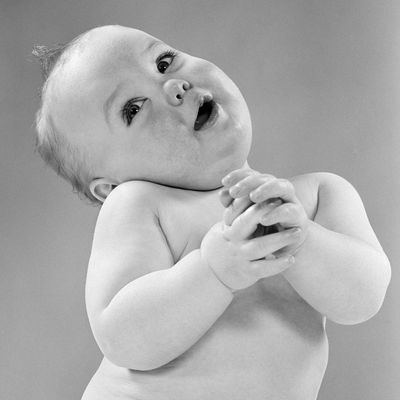
The power of cuteness came home for me when one of my oldest friends in the world — let’s call her Mary — and I were walking around Brooklyn one afternoon and there was a cute lil barefoot infant being held by a hipster mom. Mary, usually a study in composed Williamsburg cool, suddenly exclaimed, “I just want to eat their little feet!”
What.
“Like, not really,” she backpedaled. “But kind of.”
This, Mary explained to me, was what she called a “case of the babies”: an acute case of going gaga for those that go goo-goo. But, as new research indicates, the transfixing quality of cuteness is not as innocent as it may seem: At a brain level, attractive infants have an advantage over homely ones.
“Cuteness in offspring is a potent protective mechanism that ensures survival for otherwise completely dependent infants,” writes a team led by Oxford psychiatrist Morten L. Kringelbach in a new study in Trends in Cognitive Sciences. That is the brutal truth: Infants are (seemingly) helpless, and if they’re going to survive, they need to, as Kringelbach ruthlessly puts it, “easily gain access to consciousness” of adults. But that’s not the case for babies with a cleft palate or other facial irregularities. Brain scans have shown that “men and women, parents and nonparents have rapid (within 140 milliseconds) selective neural responses to infant faces,” the authors write. “This rapid activity is found in the orbitofrontal cortex when participants look at infant faces, but not at adult faces or infant faces with a craniofacial abnormality that disrupts the typical cute facial composition.”
Cuteness doesn’t just trigger an immediate response, the authors contend, but it facilitates caregiving, empathy, and compassion. It’s enough, even, to overcome otherness: The authors mention that it was a photo of a cute, dead 3-year-old Syrian refugee that was all over the internet and front pages of newspapers that seemingly prompted a change in tone around the cultural conversation of the refugee crisis. The lack of cuteness, then, has to be at least part of the reason that kids with cleft lips tend to have “adverse outcomes in child development”: a lack of cuteness interrupts the mother-child dynamic, slowing the mother-child responsiveness that’s been found to be so crucial to emotional development.
As Brian Resnick notes at Vox, the face is not the only domain of cuteness: Adults are predisposed to loving baby laughter, babbling, and their smell. Still other research indicates that men and women alike can’t help but be drawn to the cutest infant faces. That is the ugly truth: No matter how superficial it might sound, more attractive people — whether infants or adults — have a leg up in life. Maybe that’s why you’d like to eat their feet.




